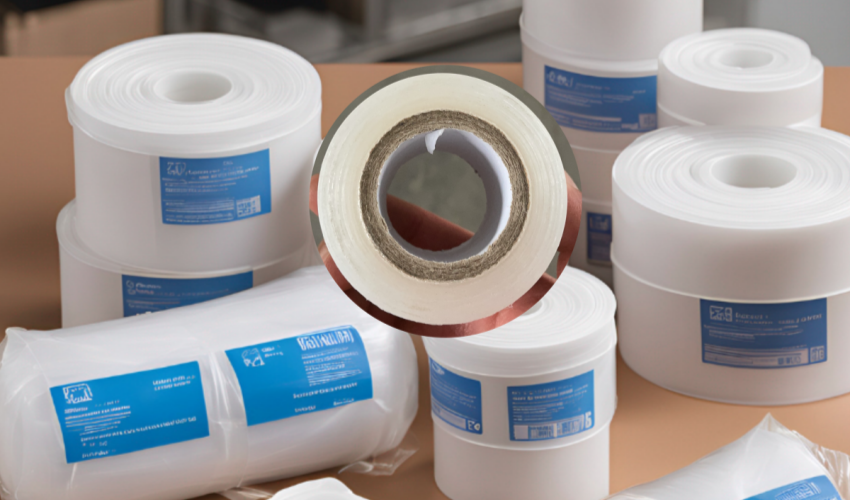
A stretch wrap calculator is an essential tool for businesses that rely on stretch film for packaging. It provides a systematic approach to determine the amount of stretch film needed for various applications, helping companies avoid waste and ensure optimal use of materials. By accurately calculating the required film dimensions and weight, a stretch wrap calculator plays a vital role in streamlining the packaging process. This not only enhances efficiency but also contributes to significant cost savings. As businesses like PWP Stretch Film strive to maximize our resources, leveraging a stretch wrap calculator becomes increasingly important for achieving packaging goals while minimizing expenses. The Stretch Wrap Calculator helps businesses determine wrap usage, calculate savings from automation, and is free to download for real-time input.
A stretch wrap calculator is a specialized tool designed to assist businesses in determining the precise amount of stretch film such as hand stretch film that needed for packaging. Its primary purpose is to streamline the wrapping process by providing accurate calculations based on specific inputs such as pallet dimensions, stretch wrap gauge , and desired stretch percentage. This ensures that companies use the optimal amount of material, reducing waste and improving efficiency.
Utilizing a stretch wrap calculator offers several advantages for businesses, including:
By incorporating a stretch wrap calculator into their operations, businesses like PWP Stretch Film can enhance your packaging practices and achieve better overall results.
The stretch wrap calculator metric is specifically designed for users who prefer to work with metric units, making it a versatile tool for businesses operating in regions that utilize the metric system. This version of the calculator allows for precise measurements in meters, centimeters, and kilograms, facilitating accurate film usage calculations.
Using metric units in stretch wrap calculations offers several benefits, including:
To effectively use the metric version of the stretch wrap weight calculator, follow these steps:
By utilizing a stretch wrap calculator that supports metric units, businesses like PWP Stretch Film can optimize your packaging processes, ensuring you use the correct amount of film while maintaining efficiency and cost-effectiveness.

The availability of a stretch wrap calculator free of charge is a significant advantage for businesses looking to optimize their packaging processes without incurring additional costs. Many online platforms offer free calculators that provide users with the ability to input various parameters and obtain accurate film usage calculations. This accessibility allows companies of all sizes to benefit from essential packaging tools.
There are numerous free online stretch film roll weight calculator available, making it easy for businesses to find one that suits their needs. These calculators are typically user-friendly and require minimal input, allowing for quick assessments of stretch film requirements. Users can find calculators on various packaging websites and industry-specific forums.
When selecting a free stretch wrap calculator, consider the following features:
By utilizing a stretch wrap calculator free from cost, businesses like PWP Stretch Film can streamline your operations and make informed decisions regarding your packaging materials, ultimately leading to improved efficiency and reduced waste.
Calculating wrap film usage in square feet is essential for businesses that require precise measurements for their packaging needs. Using a stretch wrap usage calculator that provides results in square feet enables companies to understand how much film is necessary to wrap their products effectively. This metric is particularly important for maintaining consistent packaging practices and ensuring optimal material usage.
Utilizing a stretch wrap calculator to determine film usage in square feet offers several key benefits:
To effectively use the stretch wrap calculator for square feet, follow these steps:
By employing a stretch wrap calculator that focuses on square feet, businesses like PWP Stretch Film can optimize your packaging strategies, ultimately leading to enhanced operational efficiency and cost savings.
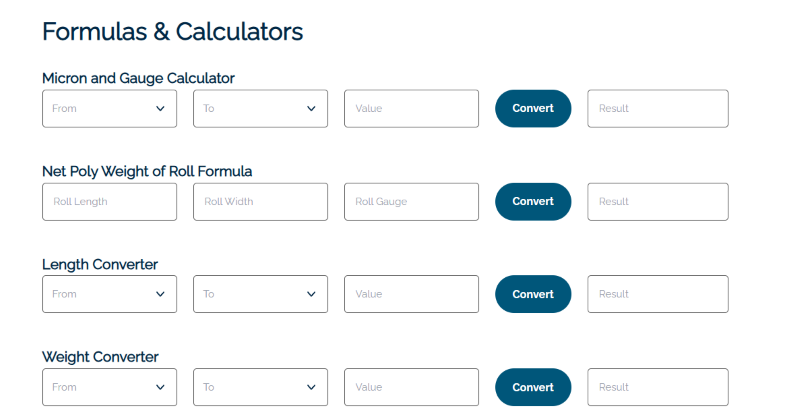
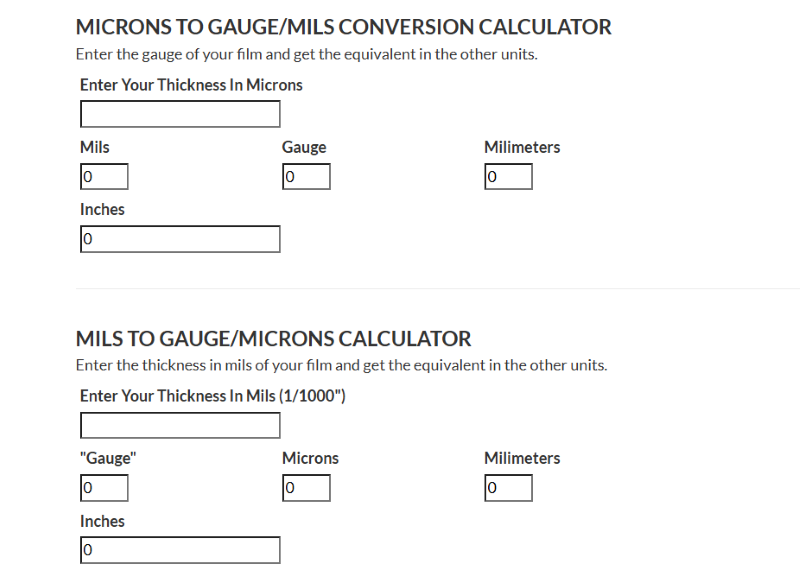
These calculators are especially useful when making bulk orders for stretch films, as precise thickness measurements are crucial for product protection and cost optimization. In industries such as shipping, packaging, and warehousing, ensuring the correct conversion between micron to gauge stretch film prevents the use of inappropriate materials that might compromise load containment.
Stretch film thickness is a critical factor in determining the durability, strength, and efficiency of the film. Measured in units like mils, microns, or gauge, the thickness directly impacts how well the film secures loads. Thicker films provide better puncture resistance for heavy or irregular loads, while thinner films are more cost-effective for lighter applications. Accurate understanding and measurement of film thickness ensure businesses use the right material to optimize cost and load protection.
Different regions and industries use varying units—such as gauge, microns, or mils—to measure stretch film thickness. Converting between these units can be challenging and lead to errors, which can result in incorrect film choices and inefficiencies. Accurate conversions ensure businesses comply with industry standards, reduce film waste, and select the right film for their application. This also improves budgeting and prevents overuse of materials.
By integrating thickness conversion into the stretch wrap calculator, businesses streamline their operations. This tool helps identify the ideal film thickness for load protection while reducing waste and unnecessary expenses. Accurate unit conversion ensures optimal material usage, enabling businesses to improve productivity, save costs, and enhance load security, ultimately contributing to a more sustainable and efficient packaging process.
The Stretch Wrap Calculator and Film Thickness Conversion Tool simplifies the process of determining stretch wrap usage while converting film thickness units accurately. It eliminates guesswork and reduces manual errors by providing quick and reliable conversions. Businesses can efficiently compare thicknesses across various unit systems, optimize film selection, and calculate savings from automation or film reduction strategies. This tool is essential for cost savings, process optimization, and ensuring proper load stability.
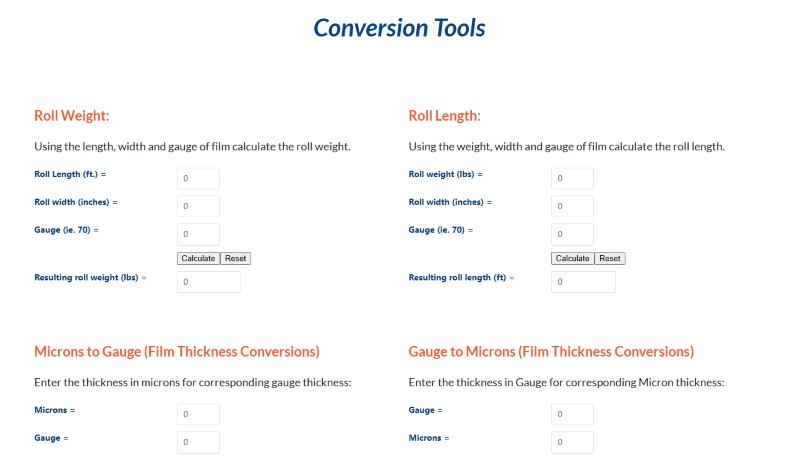
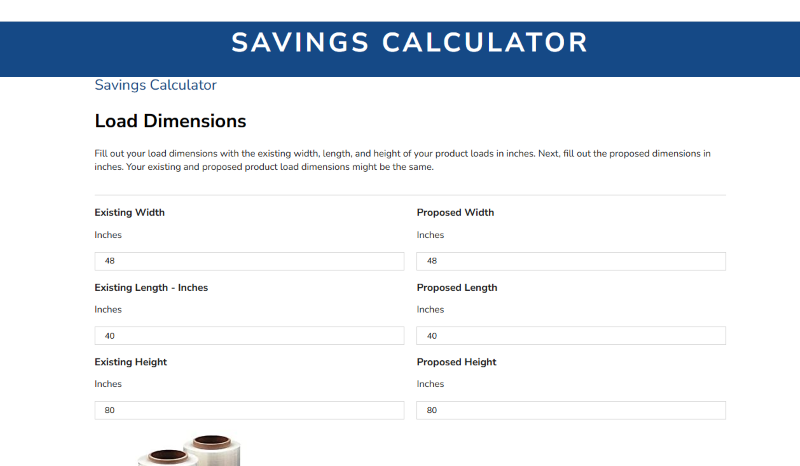
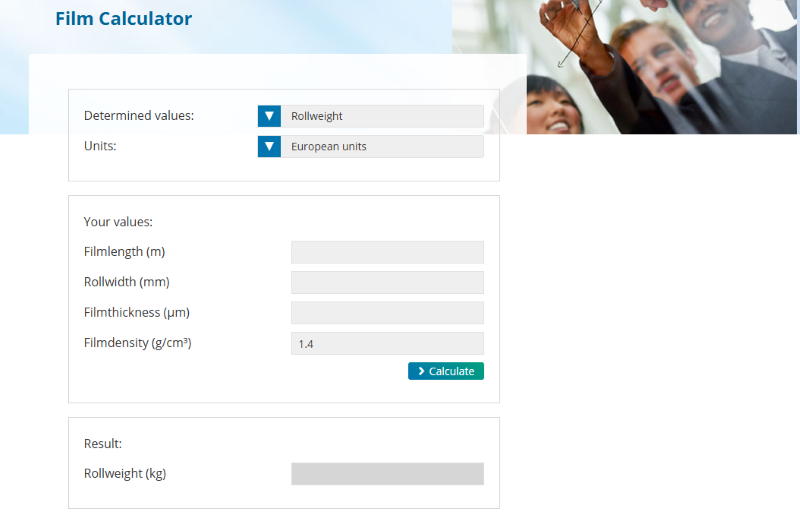
Mobile apps designed for stretch wrap calculations have become essential tools for businesses looking to optimize their packaging processes. These apps provide on-the-go access to critical calculations, allowing users to make informed decisions about their stretch film usage from anywhere.
There are several mobile applications available that cater specifically to stretch wrap calculations. These apps are designed to simplify the process, making it easier for users to determine the amount of film required for various loads. Many of these apps are available on both Android and iOS platforms, ensuring a wide range of accessibility for users.
When choosing a stretch wrap calculator app, consider the following features to ensure it meets your business needs:
By incorporating a stretch wrap calculator app into their operations, businesses like PWP Stretch Film can enhance your efficiency and accuracy in packaging decisions, ultimately leading to better resource management and cost savings.
Calculating the weight of a film roll is an important step in managing your packaging materials effectively. Utilizing a stretch wrap calculator simplifies this process, ensuring accurate measurements that can help optimize costs and usage.
When calculating film roll weight, keep the following factors in mind to ensure accuracy:
Stretch Film Weight Calculator
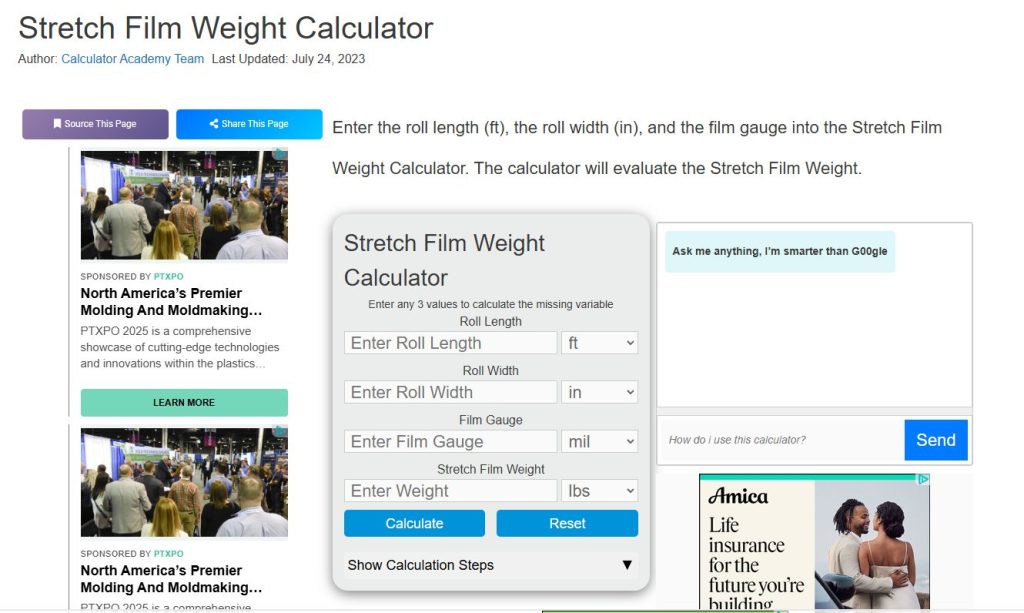
Calculating stretch film involves determining the quantity needed for a specific application, considering factors like the dimensions of the items being wrapped and the desired number of layers. To start, measure the height, width, and length of the load. Then, use a stretch wrap calculator to input these dimensions along with the film’s gauge (thickness) and roll width. The calculator will help you estimate the amount of stretch film required, ensuring you have enough material without overspending. Additionally, consider the type of stretch film—pre-stretched or regular—as this affects how much film is needed. Regular stretch film offers more stretchability but may require more material than pre-stretched options, which are designed for efficiency.
Measuring stretch wraps accurately is crucial for effective packaging. Begin by determining the dimensions of the load: height, width, and length. For cylindrical or irregularly shaped items, measure the circumference at its widest point. Use a measuring tape to get these dimensions. Once you have them, you can input the measurements into a stretch wrap calculator to determine the appropriate amount of film needed. Additionally, consider the film’s width, as this impacts the number of layers you’ll apply. For optimal results, it’s also essential to evaluate how tightly you plan to wrap the load, as this affects the overall amount of stretch wrap required.
Stretch wrap is designed to elongate to secure and stabilize products. Depending on the material and type of stretch wrap, it can stretch up to 300% of its original length. For example, a 1-foot piece of film can stretch to 3 or 4 feet when applied. The amount of stretch depends on the film type—pre-stretched film provides minimal stretch (about 30-50%), whereas machine-grade films can stretch much more due to their elasticity. Stretch wrap calculators help estimate the length of film required by factoring in stretch capacity, load dimensions, and overlap layers. Understanding stretch percentage ensures you optimize material usage and reduce waste. Overstretching, however, may compromise load security and tear the film. Therefore, using a stretch wrap calculator allows for precise estimation, balancing material efficiency with durability.
The appropriate gauge depends on load weight and application. Stretch wrap thickness is measured in “gauge,” where higher numbers indicate thicker and more durable film. For lightweight loads (under 1,000 lbs), a 60-80 gauge wrap is sufficient. For medium loads (1,000-2,500 lbs), use 90-120 gauge. Heavy-duty loads exceeding 2,500 lbs require 150-200 gauge for maximum security. A stretch wrap calculator considers factors like load size, weight, and wrap type to recommend the correct gauge. Selecting the proper gauge reduces material usage while ensuring stability. For cost savings, consider pre-stretched wraps, which are thinner but retain strength. Misjudging the gauge can lead to film tearing or excess consumption, increasing costs. Stretch wrap calculators streamline this process, helping you match the right thickness to your application.
Stretch wrap longevity depends on environmental conditions, storage, and material quality. Typically, stretch wrap can last 6-12 months in optimal conditions—indoors, away from UV light, and stored in moderate temperatures. Over time, prolonged exposure to sunlight, humidity, or extreme heat can cause the wrap to degrade, losing its elasticity and strength. UV-stabilized stretch wraps can last longer outdoors, often up to a year, but standard wraps deteriorate more quickly. A stretch wrap calculator helps determine the necessary amount of film for immediate applications, minimizing waste and reducing the need for long-term storage. To maximize stretch wrap lifespan, store rolls properly in a cool, dry environment. If used for pallet wrapping, ensure the load is stable and the wrap is tight, which improves durability and reduces potential film damage.
Cast stretch wrap is made through a casting process, resulting in a clear, smooth, and quiet film that unwinds easily. It is ideal for applications requiring high clarity, like scanning barcodes. Cast wrap stretches more but offers lower puncture resistance compared to blown wrap.
Blown stretch wrap is created through a blowing process, giving it a textured, tacky finish that adheres better to loads. It provides superior strength, puncture resistance, and durability, making it ideal for heavy or irregularly shaped loads. However, blown film is noisier when unwinding and has lower clarity.
Using a stretch wrap calculator helps you determine which type to use based on load requirements and application specifics. For heavy-duty tasks, blown wrap is preferred, while cast wrap is cost-effective for lighter, more uniform loads.
Shrink wrap shrinks tightly around items when heat is applied, making it ideal for bundling smaller products, like retail packaging. It provides a tight seal that protects against moisture, dust, and tampering. Shrink wrap does not stretch and requires heat tools during application.
Stretch wrap, on the other hand, is elastic and stretches around loads without requiring heat. It is primarily used to stabilize and secure pallets or larger items during transportation. Stretch wrap is cost-effective, easier to apply, and adaptable for both manual and machine use.
A stretch wrap calculator focuses on stretch film applications, calculating the needed amount, stretch percentage, and load coverage. Understanding the difference between shrink and stretch wrap ensures you choose the correct solution for your application. For pallet wrapping and securing heavy loads, stretch wrap is superior.

My name is James Thompson, and I’m the editor of this website dedicated to Stretch Film, Pallet Wrap, and Stretch Wrap products.
My passion for packaging began when I noticed the challenges companies face in securing their products efficiently for transportation and storage. This inspired me to delve deep into the world of stretch films and pallet wraps, exploring the latest technologies and best practices.
I aim to provide valuable insights, practical tips, and up-to-date industry trends to assist you in making informed decisions. Whether you’re a small business owner or part of a large corporation, my goal is to support you in optimizing your operations and ensuring your products reach their destination safely.
Thank you for visiting, and I look forward to accompanying you on your journey toward better packaging solutions.
Comments are closed